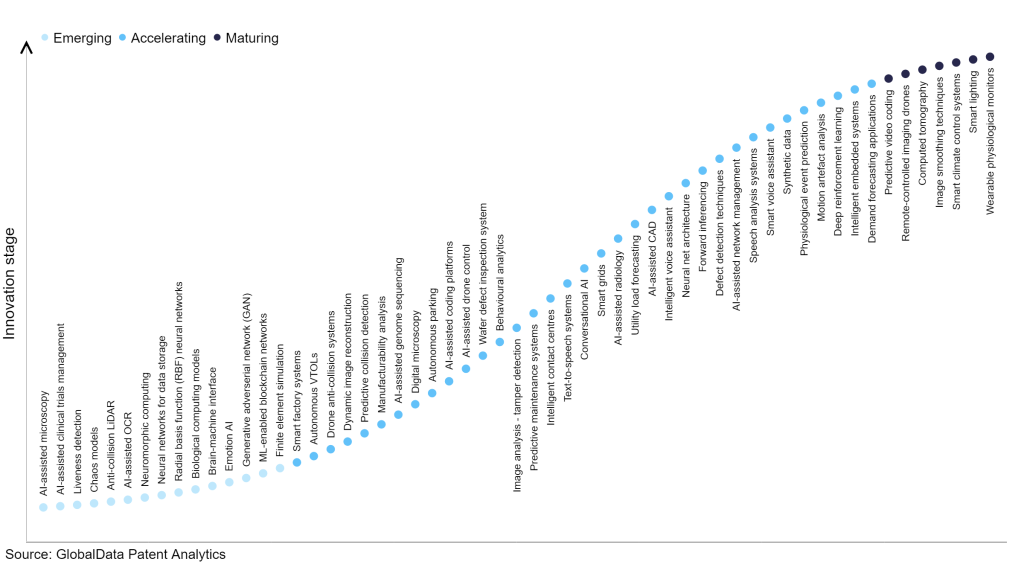The technology industry continues to be a hotbed of innovation, with activity driven by increasing demand for process automation, the need for operational agility and flexibility, the ability of artificial intelligence (AI) to enhance overall production quality, and growing importance of technologies such as machine learning, computer vision, robotics, and data analytics, which collectively contribute to the advancement of intelligent manufacturing processes. In the last three years alone, there have been over 3.6 million patents filed and granted in the technology industry, according to GlobalData’s report on Innovation in Artificial Intelligence: Smart factory systems. Buy the report here.
However, not all innovations are equal and nor do they follow a constant upward trend. Instead, their evolution takes the form of an S-shaped curve that reflects their typical lifecycle from early emergence to accelerating adoption, before finally stabilising and reaching maturity.
Identifying where a particular innovation is on this journey, especially those that are in the emerging and accelerating stages, is essential for understanding their current level of adoption and the likely future trajectory and impact they will have.
300+ innovations will shape the technology industry
According to GlobalData’s Technology Foresights, which plots the S-curve for the technology industry using innovation intensity models built on over 2.5 million patents, there are 300+ innovation areas that will shape the future of the industry.
Within the emerging innovation stage, finite element simulation, ML-enabled blockchain networks and generative adversarial network (GAN), are disruptive technologies that are in the early stages of application and should be tracked closely. Demand forecasting applications, intelligent embedded systems, and deep reinforcement learning are some of the accelerating innovation areas, where adoption has been steadily increasing. Among maturing innovation areas are wearable physiological monitors and smart lighting, which are now well established in the industry.
Innovation S-curve for artificial intelligence in the technology industry

Smart factory systems is a key innovation area in artificial intelligence
Smart factory systems are modernized production systems that combine information technology (IT) and operational technology (OT) to facilitate streamlined and productive manufacturing processes. These systems leverage data, analytics, cloud computing, automation, robotics, artificial intelligence (AI), and the Internet of Things (IoT) to achieve real-time monitoring of operations and process optimization.
GlobalData’s analysis also uncovers the companies at the forefront of each innovation area and assesses the potential reach and impact of their patenting activity across different applications and geographies. According to GlobalData, there are 360+ companies, spanning technology vendors, established technology companies, and up-and-coming start-ups engaged in the development and application of smart factory systems.
Key players in smart factory systems – a disruptive innovation in the technology industry
‘Application diversity’ measures the number of different applications identified for each relevant patent and broadly splits companies into either ‘niche’ or ‘diversified’ innovators.
‘Geographic reach’ refers to the number of different countries each relevant patent is registered in and reflects the breadth of geographic application intended, ranging from ‘global’ to ‘local’.
Patent volumes related to smart factory systems
| Company | Total patents (2010 - 2022) | Premium intelligence on the world's largest companies |
| State Grid | 498 | Unlock Company Profile |
| Siemens | 392 | Unlock Company Profile |
| Hitachi | 351 | Unlock Company Profile |
| Mitsubishi Electric | 283 | Unlock Company Profile |
| Intel | 251 | Unlock Company Profile |
| Hyundai Heavy Industries | 205 | Unlock Company Profile |
| Boeing | 197 | Unlock Company Profile |
| Emerson Electric | 150 | Unlock Company Profile |
| Furukawa | 148 | Unlock Company Profile |
| Mitsubishi Heavy Industries | 133 | Unlock Company Profile |
| China Southern Power Grid | 122 | Unlock Company Profile |
| NEC | 118 | Unlock Company Profile |
| Honeywell International | 112 | Unlock Company Profile |
| Yokogawa Electric | 110 | Unlock Company Profile |
| Toshiba | 107 | Unlock Company Profile |
| Panasonic | 90 | Unlock Company Profile |
| Omron Tateisi Electronics | 88 | Unlock Company Profile |
| Rockwell Automation | 81 | Unlock Company Profile |
| General Electric | 76 | Unlock Company Profile |
| Korea Development Bank | 74 | Unlock Company Profile |
| Gree Electric Appliances | 72 | Unlock Company Profile |
| LG | 67 | Unlock Company Profile |
| Samsung Heavy Industries | 61 | Unlock Company Profile |
| Japan Wool Textile | 61 | Unlock Company Profile |
| ABB | 59 | Unlock Company Profile |
| Scottish Mortgage Investment Trust | 58 | Unlock Company Profile |
| Fanuc | 57 | Unlock Company Profile |
| Schneider Electric | 57 | Unlock Company Profile |
| China Petrochemical | 52 | Unlock Company Profile |
| International Business Machines (IBM) | 52 | Unlock Company Profile |
| Dell Technologies | 51 | Unlock Company Profile |
| China Tobacco International | 48 | Unlock Company Profile |
| EssilorLuxottica | 47 | Unlock Company Profile |
| China Tobacco Yunnan Industrial | 47 | Unlock Company Profile |
| NIKE | 46 | Unlock Company Profile |
| POSCO | 46 | Unlock Company Profile |
| Fujifilm | 42 | Unlock Company Profile |
| Bayerische Motoren Werke | 42 | Unlock Company Profile |
| Omron | 41 | Unlock Company Profile |
| Gebr Knauf | 41 | Unlock Company Profile |
| Hon Hai Precision Industry | 40 | Unlock Company Profile |
| Inspur Electronic Information Industry | 39 | Unlock Company Profile |
| Robert Bosch Stiftung | 38 | Unlock Company Profile |
| Amazon.com | 38 | Unlock Company Profile |
| Aviation Industry | 37 | Unlock Company Profile |
| Safran | 37 | Unlock Company Profile |
| State Grid Information and Telecommunication | 35 | Unlock Company Profile |
| Toshiba Mitsubishi-Electric Industrial Systems | 34 | Unlock Company Profile |
| Reactive Technologies | 33 | Unlock Company Profile |
| Illinois Tool Works | 32 | Unlock Company Profile |
Source: GlobalData Patent Analytics
State Grid Corporation of China is a leading patent filer in smart factory systems. One of the company’s patents is related to a power demand side management platform comprising five sub-layers: a data source layer, a network layer, a data layer, a support layer, and an application layer. This platform enables services such as power information monitoring analysis, energy application services, and demand-side management information issuance for various users. It provides fault early warning, fault detection, fault analysis, automatic fault processing, cost reduction, improved response speed, shortened problem-solving time, and enhanced user satisfaction for safe, stable, and efficient operation of service systems.
Other prominent patent filers in the space include Siemens and Hitachi.
By geographic reach, Thomson Reuters Global Resources leads the pack, followed by THORLABS and Reactive Technologies. In terms of application diversity, Intel holds the top position, followed by Precitec Optronic and Alphabet.
Artificial intelligence (AI) innovation in smart factory systems has revolutionized the manufacturing industry by incorporating advanced technologies for automation and optimization. AI enables intelligent decision-making, predictive maintenance, and real-time data analysis, leading to improved efficiency, productivity, and cost-effectiveness in smart factories.
To further understand how artificial intelligence is disrupting the technology industry, access GlobalData’s latest thematic research report on Artificial Intelligence (AI) – Thematic Intelligence.
Data Insights
From

The gold standard of business intelligence.
Blending expert knowledge with cutting-edge technology, GlobalData’s unrivalled proprietary data will enable you to decode what’s happening in your market. You can make better informed decisions and gain a future-proof advantage over your competitors.







